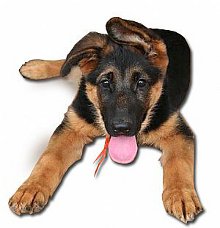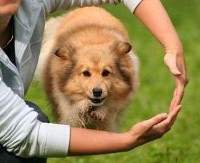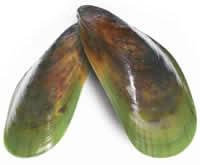Hip dysplasia and other joint problems are so common in dogs nowadays that people view these diseases as inevitable, as if they’re natural and unpreventable.  However, worldwide research has continuously proven that these conditions are not inevitable. They are caused by cooked foods. Every study that has tested one group on raw foods and the other on cooked has concluded that the subjects eating only cooked foods show a decline in health, whereas the health improves in the animals fed a raw diet.
However, worldwide research has continuously proven that these conditions are not inevitable. They are caused by cooked foods. Every study that has tested one group on raw foods and the other on cooked has concluded that the subjects eating only cooked foods show a decline in health, whereas the health improves in the animals fed a raw diet.
A predisposition to arthritis and joint dysplasia can be inherited, too, but it’s just like any predisposition. If preventative steps are taken, the diseases can be avoided.
Cats and small dogs may develop joint problems, but it’s far more common in large dogs. Here is a list of breeds which are particularly susceptible:
| American BulldogAmerican Staffordshire TerrierBeagleBernese Mountain Dog
Bloodhound Bouvier des Flandres Boykin Spaniel Briard Brittany Bulldog Bullmastiff Chesapeake Bay Retriever Chow Chow Clumber Spaniel Coonhound (Black and Tan) Coton de Tulear Curly Coated Retriever English Setter English Springer Spaniel German Shepherd Giant Schnauzer |
Golden RetrieverGordon SetterIrish Water SpanielKuvasz
Neapolitan Mastiff Newfoundland Norwegian Elkhound Old English Sheepdog Otterhund Polish Lowland Sheepdog Portuguese Water Dog Pudelpointer Pug Rottweiler Shih Tzu Spanish Water Dog St. Bernard Staffordshire Terrier Sussex Spaniel Welsh Corgi Welsh Springer Spaniel |
 Conventional treatment calls for corticosteroids and anti-inflammatories. These drugs mask the symptoms, giving temporary relief, but they don’t cure the disease. And when the drugs wear off, the underlying conditions have worsened. Sadly, euthanasia is an all too common result.
Conventional treatment calls for corticosteroids and anti-inflammatories. These drugs mask the symptoms, giving temporary relief, but they don’t cure the disease. And when the drugs wear off, the underlying conditions have worsened. Sadly, euthanasia is an all too common result.
Herbal and Naturopathic Help
An ounce of prevention is worth a pound of cure. Start your pet out right away on a natural diet. Exercise is also important, but be careful of putting too much and too frequent strain on the joints. For example, if your vehicle is high, and you take your dog with you to the mountains regularly, give him assistance getting out of the vehicle. Continued impact can wear away the cartilage between the bones.
 If your dog is predisposed to joint problems, or if your dog or cat already has arthritis or dysplasia, give glucosamine sulfate, chondroitin sulfate, and MSM. Your dog or cat may not be able to digest pills, however, because their intestinal tracts are short, designed for expedient raw meat metabolism. Therefore tablets or capsules may go in one end and out the other. Crush tablets, open capsules, or use liquid supplements, and give your pet’s body further assistance with digestive enzymes. See Dosage Guide.
If your dog is predisposed to joint problems, or if your dog or cat already has arthritis or dysplasia, give glucosamine sulfate, chondroitin sulfate, and MSM. Your dog or cat may not be able to digest pills, however, because their intestinal tracts are short, designed for expedient raw meat metabolism. Therefore tablets or capsules may go in one end and out the other. Crush tablets, open capsules, or use liquid supplements, and give your pet’s body further assistance with digestive enzymes. See Dosage Guide.
If your pet is overweight, take steps to maintain a healthy weight. Not only does this lower the progression of the disease, the reduced weight puts less strain on the joints.
Cartilage, which is what chondroitin is derived from, has also been shown to help. It’s available in many forms, but the best way to give your pet cartilage is to feed them raw bones.
 Powdered sea cucumber has been reported not only to reduce joint pain, but also to treat the disease, and it has a fishy smell that dogs and cats like.
Powdered sea cucumber has been reported not only to reduce joint pain, but also to treat the disease, and it has a fishy smell that dogs and cats like.
New Zealand green-lipped mussels contain protein, minerals, glucosamine and Eicosatetraenoic acids (ETAs), which are a type of Omega-3 fatty acids. Studies have shown they provide anti-inflammatory effects which help to reduce joint pain in arthritic conditions.
There are other supplements that have been shown to help, but these seem to be the favorites. Make sure your pet’s diet includes sufficient omega-3 fatty acids, antioxidants, and enzymes.
For joint pain, boswellia and yucca root are tried and true anti-inflammatories. For rheumatoid conditions as well as inflammation, use bupleurum root and sarsaparilla root. Sarsaparilla has also been used as a blood purifier, muscle builder, and energy rejuvenator. In addition, hyaluronic acid, which is a protein component of connective tissue, is comprised of water-holding molecules that fill up space between cells in connective tissues, providing a cushion in the joints. And Chinese skullcap is an effective pain reliever and antioxidant.
In addition, horsetail is rife with silica, which supports healthy bones and connective tissues.
Homeopathy
Because it can be difficult for the average pet owner to accurately diagnose whether their dog or cat’s joint pain is due to dysplasia, osteoarthritis, or rheumatoid arthritis, consulting with a holistic veterinarian is imperative before starting a homeopathic treatment. Osteoarthritis is common and is caused by damage to the joint tissues. Rheumatoid arthritis is uncommon and is an autoimmune disorder in which the immune system attacks healthy joint tissues. Individual diagnosis is necessary.